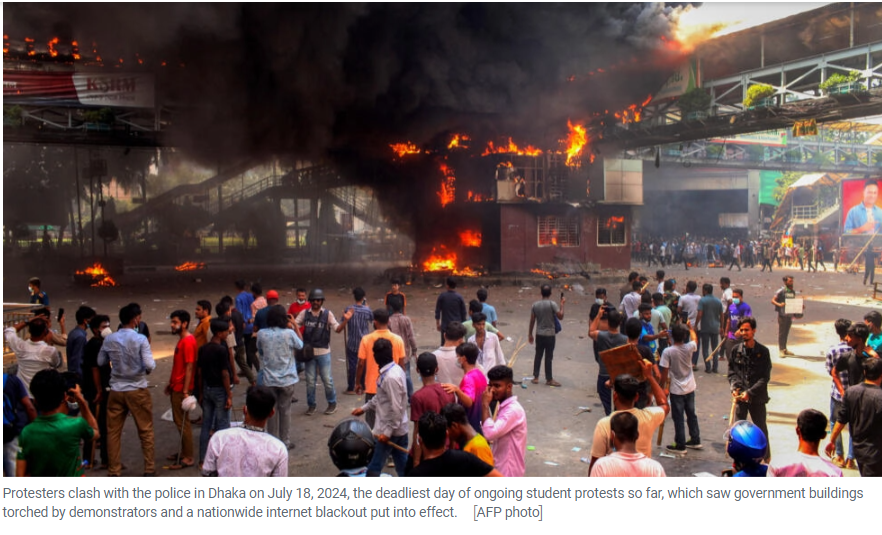AWIP, International Relations, News Analysis
Q. Explain the root cause of the ongoing reservation agitation in Bangladesh. Do you think this is an ultimatum for the Indian government to rationalize the Indian reservation system?
Why in News?
The ongoing reservation agitation in Bangladesh primarily stems from the country’s quota system. This system reserves a certain percentage of government jobs for individuals belonging to specific categories, primarily children and grandchildren of freedom fighters. The protests are in response to a High Court ruling in June that reinstated the 30% quota in government jobs for family members of freedom fighters of the 1971 Bangladeshi Liberation War. The reservation system, abolished in 2018 after widespread protests, has rekindled anger among young job seekers and students who fear they will be deprived of opportunities due to the quota.
Protests against job quotas in Bangladesh have escalated into violence, causing over 100 deaths and leading to a siege of Dhaka. In response, the Sheikh Hasina government has imposed a curfew and an internet shutdown. New Delhi has considered it an internal matter for Bangladesh and has refrained from commenting. Meanwhile, the Indian mission in Bangladesh has assisted 978 Indians in returning home, with 778 crossing land borders and around 200 traveling by flights.
Background – reservation policy of Bangladesh
- The system was notified on September 5, 1972, reserving 30% of government and semi-government posts for freedom fighters, and 10% for women.
- Sheikh Hasina served her first term as Prime Minister of Bangladesh from June 1996 to July 2001 (Party: The Bangladesh Awami League, often simply called the Awami League), benefits of the freedom fighters’ quota were subsequently extended to their sons and daughters.
- In 2009, Sheikh Hasina returned as the Prime Minister and, two years later, she extended quota benefits to include the grandchildren of freedom fighters.
- All reservations in jobs, including the freedom fighters’ quota, were scrapped by the Sheikh Hasina government in 2018 after a large-scale agitation by students.
- Since 2018, there was no quota until a group of petitioners went to the High Court in 2021 and fought a case to get back the 30% freedom fighters’ reservation in civil services.After hearing the issue for three years, the high court reinstated the 30% quota on July 1. This triggered the recent protests.
Root Cause of Reservation Agitation in Bangladesh
The key issues fueling the protests are:
- Inequity and Unfairness: Critics argue that the system creates an unfair advantage for those belonging to privileged families, regardless of merit or qualification. Protesters are questioning why the third generation of freedom fighters should be given benefits, and demanding a total merit-based recruitment.
- Unemployment and Stagnation: The quota system has led to a large pool of highly qualified but unemployed youth, creating widespread discontent and frustration.
- Corruption and Abuse: Allegations of corruption and misuse of the quota system have eroded public trust and fueled anger.
- Lack of Meritocracy: The emphasis on quotas over merit undermines the principle of equal opportunity and hinders the development of a skilled workforce.
Solution
The Bangladesh Supreme Court scaled back the quota system, offering a major victory to the protesters. The 30% quota has now been brought down to 5%, and remaining reservations to 2% (Tribal communities and persons with disabilities or identifying as third gender under Bangladeshi law will each get 1% reservation), while 93% government jobs would be open for all Bangladeshis.
Ultimatum for India?
- While the situation in Bangladesh primarily concerns its internal policies, neighboring countries like India may observe and monitor it.
- However, it’s not necessarily an ultimatum for India. The Indian government’s reservation system has its unique historical context and challenges.
- India’s reservation system aims to uplift marginalized communities and address historical injustices. Rationalizing it involves balancing social equity with merit-based opportunities.
- The two countries’ contexts differ significantly, and India’s reservation system remains a complex and multifaceted issue.
The protests in Bangladesh do serve as a cautionary tale for India. They highlight the potential pitfalls of an overly rigid and expansive reservation system. It’s essential for India to continually evaluate the effectiveness of its reservation policies and make necessary adjustments to ensure equity, fairness, and meritocracy.
Ultimately, the success or failure of reservation systems depends on their implementation and the overall socio-economic conditions of a country. While learning from the experiences of others is valuable, each nation must find its own path to achieving social justice and inclusivity.
In summary, while the agitation in Bangladesh highlights the importance of fair and inclusive policies, it is not directly an ultimatum for India. Both nations must continue addressing their unique challenges while promoting social justice.


